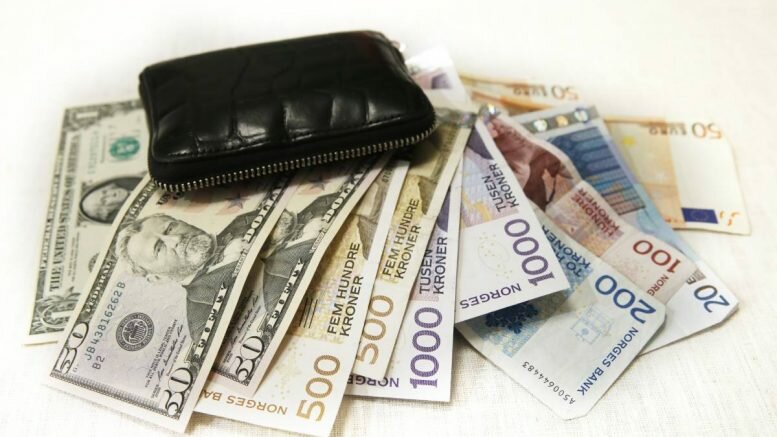Ever wondered how, when it comes to minimum wage, Norway compares to other countries?
Whether you’re moving to Norway, traveling to Norway, considering one or the other – or you’re simply curious – we’re here to answer your questions about minimum wage in Norway.
It’s a common belief that Norway provides its inhabitants with some of the best working and living conditions in the world. After all, the United Nation’s World Happiness Report ranked Norway the 5th happiest country in the world in 2020 using the following six factors: levels of corruption income, freedom, GDP, generosity, life expectancy, and social support.
So, it’s no surprise that expecting a higher-than-average minimum wage is common for those moving to Norway. While Norway indeed, comparatively, fares well in terms of workers’ conditions, the entire situation is a little more complicated than it seems.
Minimum wages in Norway
Here’s a shocker: in Norway, no minimum wage requirement actually exists.
Instead of having federally mandated levels of minimum wages, Norway’s trade unions negotiate workers’ payments by industry. So, agreed-upon wage levels vary across sectors.
Norway’s trade unions are powerful establishments that aim to secure fair wages for their workers and keep the high standard of living high.
Most smaller unions in Norway are affiliated with a larger confederation. The country has a handful of giant union confederations – the largest numbers around 900,000 members (that’s out of Norway’s 5.4 million population). The confederations handle collective bargaining. Their goal is to negotiate wage levels with companies, and when they’re agreed upon, all industry workers get the new wages, not just the union members.
Keep in mind that wages still aren’t universal and can vary by skill level and age.
Let’s take a closer look by industry.
Agriculture and horticulture
The following wages apply from June 1, 2019:
Vacation and harvest workers
- Workers under 18 years of age: NOK 103.15
- Over 18 years of age – employed for up to 12 weeks: NOK 123.15
- Over 18 years of age – employed 12 to 24 weeks (3-6 months): NOK 128.65
- Over 18 years of age – employed for more than 6: NOK 143.05
Permanently employed workers
- Unskilled workers: NOK 143.05
- Workers under 18 years of age: NOK 112.65
- Supplement for skilled workers: NOK 11.75
Cleaning
The following wages apply from June 1, 2019:
- Workers who perform cleaning work: NOK 187.66
- Workers under 18 years of age who perform cleaning work: NOK 139.62
Construction
The following wages apply from June 1, 2019:
- For skilled workers: NOK 209.70
- For unskilled workers without any experience of construction work: NOK 188.40
- For unskilled workers with at least one year’s experience of construction work: NOK 196.50
- For workers under 18 years of age: NOK 126.50
Electricians
The following wages apply from June 1, 2019:
- For skilled workers carrying out skilled work: NOK 217.63
- For other workers: NOK 189.52
Fish processing
The following wages apply from June 1, 2019:
- For skilled workers: NOK 195.20
- For production workers: NOK 183.70
- Workers under 18 years of age: minimum hourly wage of 80% of the minimum wage rate
Transportation
The following wages apply from June 1, 2019:
- For employees carrying out freight transport by road (with vehicles with total weight over 3.5 tons): NOK 175.95
Hotel, restaurant, and catering
The following wages apply from June 1, 2019:
- Workers over 20 years of age and workers over 18 years of age who has a minimum of four months’ work experience: NOK 167.90
- 16 years old: NOK 110.33
- 17 years old: NOK 119.83
- 18 years old: NOK 134.09
Maritime construction
The following wages apply from June 1, 2019:
- For skilled workers: NOK 178.55
- For semi-skilled workers: NOK 170.53
- For unskilled workers: NOK 162.60
Passenger transport by tour bus
The following wages apply from June 1, 2019:
- Employees of enterprises operating passenger transport by coach or bus: NOK 158.37
Other industries’ wages
Only the industries above have any sort of wages agreed in this way in Norway.
Other worker expenses
Overtime, shift, and supplement payments vary by industry.
Workers must be provided with the following by employers:
- All protective clothing and footwear needed for the job
- Information regarding contracts and wage details
- Overnight accommodation expenses where necessary for the job
Find the full minimum wage information here as confirmed by the government of Norway.
The average salary in Norway
Now that we’ve covered minimum wages, let’s take a look at the supposedly high average salary Norway is known for.
Norway does indeed consistently top the highest standard of living lists across the world. As such, the country has high salaries when compared to others.
Here are average monthly earnings in Norway by sector and sex:
- Sum all sectors: 47 290 (men: 50 080, women: 43 850)
- Private sector and public enterprises: 47 800 (men: 50 100, women: 43 180)
- Local government: 43 250 (men: 45 040, women: 42 630)
- Central government: 51 260 (men: 55 300, women: 48 510)
For your reference, a Norway salary database (with other data related to Norway) is Statistics Norway, also known as SSB.
Costs of living in Norway
If you’re wondering what a good salary in Norway is… There’s no universal answer. Costs of living in Norway vary – for example, someone living in the capital city Oslo might have a higher cost of living and need a higher salary than someone living in northern Tromsø.
There are many costs that employee payments, including the minimum wages listed above, need to cover in Norway. For one, there are taxes which are, like salaries, relatively high compared to other countries.
Living in Norway is expensive – and the country’s collective bargaining system aims to make that easier for employees.
A study for 2020 ranked Norway 2nd in terms of living costs out of all the countries in the world, using the following factors: cost of living, eating out, groceries, purchasing power, and rent.
Currency
Maybe you aren’t familiar with Norwegian currency.

If you’re wondering what the minimum wage in Norway is in euro, what the average salary is in rupee, what the average incomes are in peso… We’ve got you covered, too.
Here’s a look at how Norway’s currency roughly compares to others worldwide, at the time of writing.
- Norwegian currency to USD: 1 NOK = 0.1029 USD
- Norway currency to EURO: 1 NOK = 0.0918 EUR
- Norwegian krone to POUND: 1 NOK = 0.0834 GBP
- Norway currency to INR: 1 NOK = 7.7586 INR
- Norwegian currency to Sweden currency SEK: 1 NOK = 0.9644 SEK
- Norway currency to Albanian currency ALL: 0.9644 ALL
- Norwegian currency to Angolan currency AOA: 1 NOK = 19.2400 AOA
- Norway currency to Argentinian currency ARS: 1 NOK = 19.2400 ARS
- Norwegian currency to Australian currency: 1 NOK = 0.1504 AUD
- Norway currency to Bahrain currency: 1 NOK = 0.0447 BHD
- Norwegian currency to Bangladesh currency: 1 NOK = 0.0447 BDT
- Norway currency to Bulgarian currency: 1 NOK = 0.2174 BGN
- Norwegian currency to Bolivian currency: 1 NOK = 0.2174 BOB
- Norway currency to Brazil currency: 1 NOK = 0.1590 BND
- Norwegian currency to Canadian currency: 1 NOK = 0.1412 CAD
- Norway currency to Chilean currency: 1 NOK = 0.8171 CLP
- Norwegian currency to Chinese currency: 1 NOK = 0.8171 CNY
- Norway currency to Colombian currency: 1 NOK = 346.5500 COP
- Norwegian currency to Congo currency: 1 NOK = 346.5500 CDF
- Norway currency to Croatia currency: 1 NOK = 0.8361 HRK
- Norwegian currency to Czech currency: 1 NOK = 2.4615 CZK
- Norway currency to Danish currency: 1 NOK = 0.6881 DKK
- Norwegian currency to Egypt currency: 1 NOK = 0.6881 EGP
- Norway currency to Fiji currency: 1 NOK = 0.6881 FJD
- Norwegian currency to Hong Kong currency: 1 NOK = 0.8027 HKD
- Norway currency to Hungarian currency: 1 NOK = 32.9497 HUF
- Norwegian currency to Iceland currency: 1 NOK = 14.3751 ISK
- Norway currency to Indonesian currency: 1 NOK = 1,458.8000 IDR
- Norwegian currency to Israel currency: 1 NOK = 0.4580 ILS
- Norway currency to Japan currency: 1 NOK = 11.0331 JPY
- Norwegian currency to Korea currency: 1 NOK = 124.0450 KRW
- Norway currency to Kuwait currency: 1 NOK = 124.0450 KWD
- Norwegian currency to Malaysian currency: 1 NOK = 0.4424 MYR
- Norway currency to Mexican currency: 1 NOK = 2.5849 MXN
- Norwegian currency to New Zealand currency: 1 NOK = 0.1609 NZD
- Norway currency to Pakistan currency: 1 NOK = 12.2100 PKR
- Norwegian currency to Philippines currency: 1 NOK = 5.8005 PHP
- Norway currency to Polish currency: 1 NOK = 0.4107 PLN
- Norwegian currency to Russian currency: 1 NOK = 7.0115 RUB
- Norway currency to Saudi Arabia currency: 1 NOK = 0.4357 SAR
- Norwegian currency to Singapore currency: 1 NOK = 0.1440 SGD
- Norway currency to South African currency: 1 NOK = 1.6934 ZAR
- Norwegian currency to Thai currency: 1 NOK = 3.1879 THB
- Norway currency to Turkey currency: 1 NOK = 0.7108 TRY
- Norwegian currency to United Arab Emirates currency: 1 NOK = 0.4223 AED
So… What do you think about Norway’s approach to wages? Write to us and let us know.
Source: Norway Today


Sounds tempting!